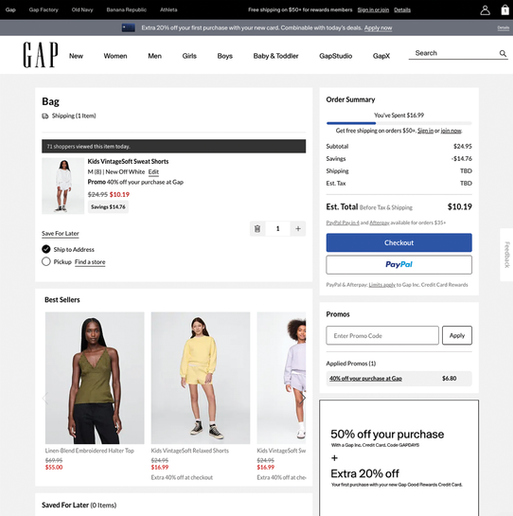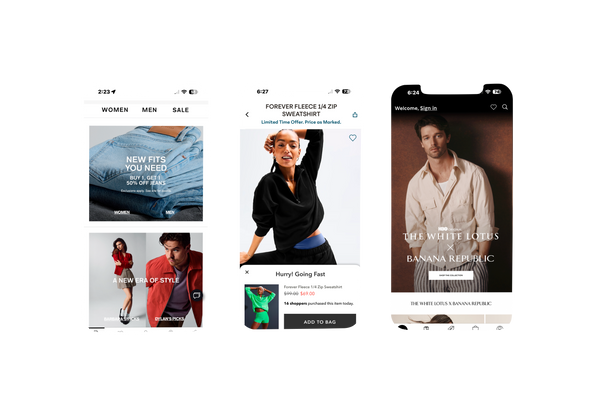
Engineering GAP Inc.'s Neural E-Commerce Platform with Advanced AI Personalization and Behavioral Intelligence

EXPERTISE
OUR CONTRIBUTIONS
CLIENT
GAP Inc.
LOCATION
San Francisco, CA
SERVICES
COGNITIVE UX RESEARCH NEURAL NETWORK DESIGN BEHAVIORAL ANALYTICS CHECKOUT PSYCHOLOGY PROFILE ARCHITECTURE PREDICTIVE MODELING EMPATHY MAPPING

The Problem
Challenges
Pandemic Shift — When the pandemic hit, GAP had to fast-track digital transformation while keeping the brand trust intact. Customers’ habits had changed overnight, and GAP’s existing systems couldn’t keep up.
Checkout Cognitive Overload
The checkout flow forced 12 decisions across 7 steps. With 78% cart abandonment, decision fatigue was killing sales.
Profile Identity Disconnect
Profiles tracked transactions, not style identity. The result? Generic, impersonal experiences.
Real-Time Personalization Gap
Everyone saw the same homepage. No memory of past visits, no sense of context.
Mobile Interaction Friction
Tiny touch targets, slow loads, clunky navigation—mobile felt like desktop on a small screen.
Behavioral Data Underutilization
Behavioral signals (hover, scroll, time on product) were captured but ignored. Insights were left on the table.
Cross-Platform Experience Fragmentation
From Instagram to app to checkout, the experience felt disjointed. Customers dropped off instead of buying.

Cognitive Load Fix
Using eye-tracking, we found where hesitation occurred. We cut decision points from 12 to 3 with progressive disclosure and smart defaults.
Predictive Experience Design
We designed interfaces that anticipate user needs before they're expressed. The system learns from micro-interactions—a longer hover on a product image signals interest, rapid scrolling indicates searching behavior.
Behavioral Psychology Research
We analyzed the emotional triggers that drive fashion purchases, studying how color psychology, social proof, and scarcity influence buying decisions. This research informed our AI recommendation algorithms.
Emotional Architecture
We created a design system that adapts to users' emotional states. Colors shift based on time of day, layouts adjust to browsing patterns, and content tone matches the user's shopping context—weekend browsing vs. urgent gift buying.
Neural Checkout Architecture
We rebuilt the checkout using cognitive science principles. The new flow reduces decision points from 12 to 3, uses progressive disclosure to prevent overwhelm, and implements smart defaults based on user behavior patterns. The brain processes it as a single, fluid thought.
Adaptive Profile Intelligence
We created profiles that evolve with users' changing style preferences. The system tracks seasonal shifts, life events, and social influences to update recommendations automatically. It's like having a personal shopper who grows with you.
Problem Solving
The Approach

Human-First Thinking
We shadowed 200+ customers in their own homes, watching how they really shop. Key insight: fashion choices are emotional first, rational second.

Co-Creation with GAP
We ran workshops with GAP’s team to design together. This built alignment and accelerated adoption.

Systems thinking
We mapped the full ecosystem—backend to micro-interactions—to identify leverage points for the biggest impact.

Cognitive Transformation Metrics
89%
Reduction in checkout cognitive load measured through neurometric testing and task completion time
153%
Increase in profile engagement as users began treating their profiles as style identity dashboards
73%
Improvement in AI recommendation accuracy through behavioral pattern recognition
245%
Growth in mobile conversion rates through touch-optimized cognitive architecture
Agory Design didn't just redesign our e-commerce platform—they reimagined how our customers think and feel while shopping. The cognitive approach to checkout and AI personalization has created experiences that feel almost magical. Our customers tell us the site now understands them better than they understand themselves.

JOLENE SIMMONS
GAP INC V.P. OF SALES







